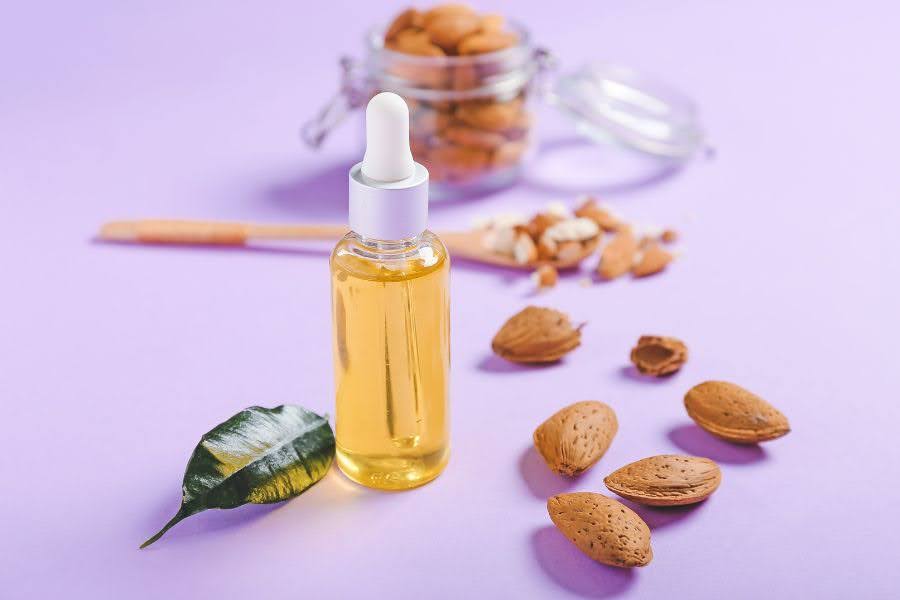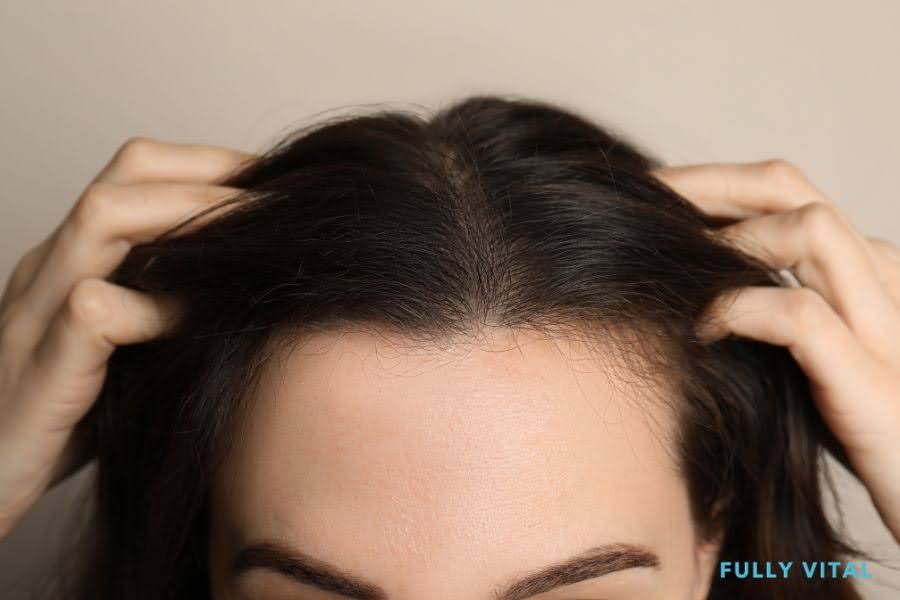
10 Proven Ways To Thicken Your Hair Naturally
When it comes to enhancing the volume and density of your hair, the allure of quick fixes can be tempting.
Yet, the path to naturally thicker hair doesn't have to be a mystery shrouded in complex treatments or expensive products.
For many individuals, the key to achieving a fuller head of hair lies in straightforward, natural methods that honor the body's own growth processes and the delicate balance of the scalp's ecosystem.
Elevate your hair care routine with our specially formulated products designed to stimulate hair growth and enhance hair thickness naturally.

I LOVE MY HAIR NOW
FullyVital hair serum and hair vitamins made tremendous improvements in my hair. I truly love my hair now.
Shop Hair ProductsUnderstanding Hair Thickness
What Determines Hair Thickness?
Hair thickness, or the diameter of each individual hair strand, is mainly influenced by genetics, as the size and shape of your hair follicles are hereditary traits.
Although you can't change your genetic makeup, lifestyle choices and environmental factors can significantly affect the health and thickness of your hair.
For instance, excessive styling and harsh chemical treatments can weaken the hair and reduce its diameter.
Conversely, maintaining good scalp health and proper nutrition can provide your hair with the necessary support to achieve its full potential thickness.
Additionally, hydration and minimizing stress play consequential roles in promoting the overall health of hair strands, potentially affecting their thickness.
Understanding these factors is crucial for anyone looking to improve the thickness of their hair naturally.
The Role Of Genetics And Age
Genetics play a foundational role in determining not only the color and texture of your hair but also its potential thickness.
However, it's normal for hair to undergo changes as you age, including variations in thickness and density.
Hormonal shifts, nutritional deficiencies, and changes in health can all contribute to the hair's life cycle and, in turn, its appearance.
While you cannot rewrite your genetic code, you can influence your hair's health and adapt to changes with age by following conscientious hair care practices.
Acknowledging the impacts of genetics and age on hair thickness sets realistic expectations, helping you to focus on the factors within your control to maintain fuller hair.
It’s crucial to prioritize scalp care and avoid harmful practices that could exacerbate the thinning process.
Balanced Diet For Hair Health
Nutrients Essential For Thick Hair
A balanced diet that's rich in specific nutrients can fortify hair from the inside out, contributing to its thickness and strength.
Essential proteins provide amino acids, which are the building blocks of hair, while biotin, a form of vitamin B, is known to enhance the hair’s keratin infrastructure.
Vital vitamins like A, C, D, and E support the sebum production in the scalp, aid in collagen production, and offer antioxidant properties, protecting hair from oxidative stress.
Minerals such as zinc and iron help hair follicle health, while omega-3 fatty acids supply oils that keep hair hydrated and dense.
Inadequate levels of these nutrients can lead to weakened and thinning hair, so maintaining a nutrient-rich diet is fundamental to achieving thicker, healthier hair.
It’s not just about individual vitamins or minerals but the synergetic effect of a well-rounded, nutrient-rich diet that supports hair health.
Foods To Incorporate In Your Diet
Incorporating specific foods into your diet can be a delicious way to influence hair thickness positively.
Foods rich in protein, like lentils, lean meats, and tofu, are essential since hair is primarily made up of protein.
Biotin-packed foods such as eggs and nuts support hair strength, while berries, spinach, and citrus fruits loaded with antioxidants can protect hair against damage from free radicals.
Salmon, flaxseeds, and walnuts offer omega-3 fatty acids, which are linked to hair growth and density.
Additionally, ensuring adequate intake of iron through sources like red meat or leafy greens can prevent anemia, a significant factor in hair thinning.
It's important to remember that no single food is a miracle cure, but a diverse diet rich in these nutrients can contribute to overall hair health and potentially lead to thicker strands.

Proper Hair Care Routine
Gentle Washing And Conditioning
The basics of a proper hair care routine start with gentle washing and conditioning.
Overwashing hair, especially with harsh detergents found in some shampoos, can strip it of its natural oils, leading to dryness and breakage.
A sulfate-free shampoo followed by a hydrating conditioner can help maintain the natural moisture balance of both hair and scalp.
While applying conditioner, focusing on the ends rather than the roots can prevent excess scalp oiliness and ensure the most vulnerable parts of the hair are being treated.
For those with particularly dry or damaged hair, leave-in conditioners or deep conditioning treatments can provide additional hydration and support.
Remember, the gentler your cleansing routine, the better your chances of preserving the thickness of your hair.
Avoiding Harsh Chemicals
Many popular hair care products contain chemicals that can damage hair over time, including parabens, sulfates, and silicones.
These substances can contribute to hair breakage, dryness, and scalp irritation, all of which can compromise hair's thickness.
To maintain a healthy hair shaft, it’s recommended to limit the use of such products and instead seek out natural and organic hair care alternatives.
This could mean swapping out your regular shampoo for one with naturally-derived surfactants or choosing styling products that nourish the hair instead of simply holding it in place.
When dyeing hair, considering options like semi-permanent dyes or naturally-derived colors can also reduce potential damage.
By minimizing your hair's exposure to harsh chemicals, you're taking an essential step towards preserving its thickness and health.
Importance Of Scalp Health
Scalp Massages To Stimulate Growth
Regular scalp massages can not only be a relaxing experience but can also contribute significantly to hair thickness.
By massaging the scalp, you increase blood flow to the region, providing hair follicles with nutrients and oxygen that are vital for hair growth.
Spending a few minutes each day using gentle circular motions can invigorate the scalp and support hair health.
This practice can be further enhanced by incorporating oils that stimulate hair growth, such as castor oil, known for its high content of ricinoleic acid.
Additionally, scalp massages can help distribute the scalp's natural oils along the hair shaft, which naturally conditions hair and improves its resilience.
Reaping the benefits of scalp massages is as simple as dedicating a few minutes of your hair care routine to this soothing practice.
Natural Oils That Benefit The Scalp
Certain natural oils have been found to have positive effects on scalp health and hair thickness.
For example, rosemary oil has been associated with increased hair growth similar to some commercial products when used consistently.
Peppermint oil, another hair-friendly option, is known for its invigorating properties and its potential to improve blood circulation to the scalp.
Coconut oil is often praised for its ability to penetrate the hair shaft and moisturize from within, thus reducing protein loss from washing and styling.
Using these oils as part of your scalp care routine can support the health of your hair follicles and, subsequently, the thickness of your hair.
When using essential oils, it is important to mix them with a carrier oil like jojoba or almond oil to prevent any potential irritation.

Staying Hydrated
Maintaining adequate hydration is crucial for all aspects of health, including that of your hair.
Water is a key component of the hair shaft, and insufficient hydration can lead to brittle hair that is prone to breakage.
Drinking enough water ensures that your body can properly manage and distribute the necessary nutrients to your hair follicles.
It also helps to regulate the scalp's oil production, providing a balanced environment where hair can thrive.
For those who struggle to consume enough water throughout the day, incorporating high-water-content foods like cucumbers, watermelon, or oranges can help.
Paying attention to your hydration status is a simple yet powerful way to promote the health and thickness of your hair naturally.
Reducing Stress
Connection Between Stress And Hair Thickness
Chronic stress can harm hair health, causing thinning or loss due to conditions like telogen effluvium.
Stress also leads to scalp issues like dandruff, affecting hair growth and thickness.
Recognizing stress's impact is the first step to finding holistic solutions for maintaining healthy hair.
Stress Management Techniques
Stress management techniques, like deep breathing, mindfulness, exercise, and proper sleep, not only maintain hair thickness but also promote overall well-being.
Incorporating these practices into your daily life creates a calm environment for healthy hair.
Natural Hair Thickening Treatments
Homemade Remedies And Masks
Homemade hair remedies and masks can be a straight-forward way to support hair thickening efforts.
Nutrient-rich ingredients found in your kitchen, like eggs and avocados, can be used to create hair masks that nourish the scalp and hair shaft.
Eggs are full of proteins and fatty acids that can help to rebuild hair strength, while the natural oils in avocados can provide deep moisture and promote hair health.
Aloe vera, another potent natural remedy, contains enzymes that rid the scalp of dead cells and promote hair growth.
Applying these natural treatments regularly can give your hair the extra boost it needs to become thicker and more resilient.
Always remember to perform a patch test before using any new treatment to ensure you don't have an adverse reaction.
Essential Oils For Hair Thickness
Essential oils are a natural, potent force in the quest for thicker hair.
Oils like lavender and cedarwood have properties that may improve scalp health and promote hair thickness.
For instance, lavender oil has been studied for its potential to increase the number of hair follicles and deepen the depth of hair follicles when used frequently.
Cedarwood oil can help balance the oil-producing glands in the scalp, thereby improving hair health and reducing hair fall.
When using essential oils, consistency and proper application are key – they should be diluted with a suitable carrier oil and massaged into the scalp to achieve the best results.
Over time, they can provide a considerable contribution to the fullness and health of your hair.
Avoiding Heat And Styling Damage
Excessive heat from styling tools, such as flat irons and curling wands, can cause significant damage to hair, weakening strands and leading to hair thinning and breakage.
To preserve hair thickness, minimizing heat styling or opting for heatless styling techniques can be beneficial.
When heat styling is necessary, using a protective spray or serum can help shield the hair shaft from high temperatures.
Additionally, avoiding tight hairstyles that pull on the hair, like high ponytails or cornrows, can prevent strain on the hair follicles, reducing risk of thinning and breakage.
Employing gentle brushing and detangling methods can also alleviate pressure on hair and maintain its natural volume.
By adopting these protective measures, you can help safeguard your hair against unnecessary damage and maintain its thickness.
Regular Trimming
Contrary to what some might believe, regular trimming is an integral part of maintaining hair thickness.
Split ends can travel up the hair shaft if left unchecked, leading to breakage and thinner-looking ends.
Trimming hair regularly, about every six to eight weeks, can prevent this type of damage from worsening and can help maintain the hair's overall health.
Though it might seem as though you're cutting away length, in the long run, trimming helps to preserve the quality and thickness of your hair.
Furthermore, well-maintained ends can help hair appear thicker and more lustrous, as they're less likely to fray and more likely to lay smoothly.
Ultimately, regular trimming is a preventative measure that can support your goal of achieving and maintaining thick hair.
Supplements For Hair Growth
Nutritional supplements, like biotin and collagen, can help improve hair thickness by addressing dietary deficiencies.
Biotin strengthens hair and reduces breakage, while collagen provides essential proteins for growth.
Vitamins like D are linked to new hair follicle creation.
Consult a healthcare provider before starting supplements, and combine them with a healthy diet and lifestyle for optimal results in enhancing hair thickness.
Unlock The Power Of Fully Vital Hair Growth ProductsHere at Fully Vital, we are dedicated to providing you with premium hair growth products that can help you achieve and maintain healthy, youthful hair. Our products are designed to address the root causes of hair aging, giving your locks the nourishment and care they deserve. Here are just a few key features and benefits of choosing Fully Vital:
Experience the transformative power of Fully Vital hair growth products and unlock the secret to radiant, youthful hair. Join the countless others who have already unlocked the potential of their locks with our products. |
Final Thoughts On How To Thicken Hair
Achieving naturally thicker hair relies on a blend of nutritious diet, proper hair care, and mindful lifestyle choices.
Instead of seeking out quick fixes, turning to the basics—nourishing foods, attentive scalp care, and moderate styling—can lead to substantial improvements in hair health and thickness.
By integrating the strategies discussed throughout this article, you can create an environment that supports your hair's natural vitality and strength.
Unveil the secret to naturally thicker hair with our range of products, crafted to support your hair's strength and vitality from the scalp up.
Check out our recent blogs:
- Achieve Gorgeous Locks: Your Path With A Reputable Hair Doctor
- Stunning Half And Half Hair Ideas: Transform Your Look Today!
- Hair Sos: How To Eliminate Stubborn Cowlicks For Good
Frequently Asked Questions About How To Thicken Hair
Can nutrition really affect my hair thickness?
Absolutely.
A diet rich in proteins, vitamins, and minerals like biotin, iron, zinc, and omega-3 fatty acids is essential for healthy hair growth and thickness.1
What daily habits can help improve hair thickness?
Gentle washing and conditioning, avoiding harsh chemicals, staying hydrated, reducing stress, and using natural oils can all contribute to the overall health and thickness of your hair.2
How does staying hydrated benefit my hair?
Adequate hydration is crucial because it impacts the health of the scalp and the elasticity of the hair strands, reducing the likelihood of dryness and breakage.3
Are there any natural remedies I can use to thicken my hair?
Yes, natural remedies such as scalp massages using essential oils like rosemary or peppermint, and homemade masks with eggs, avocado, or aloe vera can nourish your scalp and hair, promoting thickness.4
Can regular trimming really help my hair appear thicker?
Yes, regular trims help prevent split ends from traveling up the hair shaft and causing breakage, which can make your hair appear thinner.5
Do supplements help with hair thickness?
Supplements can help, especially if you have a nutritional deficiency.
Biotin, collagen, and vitamins, such as Vitamin D, are known to support hair health, but consult with a healthcare provider before starting any new supplement.6
How can I protect my hair from styling damage?
Limit the use of heat styling tools, use a heat protectant when necessary, and avoid tight hairstyles that pull on the hair.
Gentle detangling and styling can also protect hair thickness.7
Will reducing stress really improve the thickness of my hair?
Yes, since stress can lead to conditions like telogen effluvium that cause hair thinning, managing stress can prevent excessive hair fall and maintain your hair's density.8
Is a scalp massage beneficial for hair thickness?
Scalp massages can be very beneficial as they stimulate blood flow to the hair follicles, nourish the scalp, and may encourage thicker hair growth.9
Are there any specific foods I should eat for thicker hair?
Focus on foods high in protein, biotin, vitamins (A, C, D, E), iron, zinc, and omega-3s, such as lean meats, eggs, nuts, seeds, leafy greens, berries, and fatty fish.10
sources:
- Zuma Nutrition. (n.d.). The 10 best foods for hair growth. Retrieved from https://www.zumanutrition.com/blogs/health/the-10-best-foods-for-hair-growth
- Healthline. (n.d.). 9 Best hair growth products for 2024 that actually work. Retrieved from https://www.healthline.com/health/hair-growth-products
- Forbes. (n.d.). 11 Best hair growth vitamins and supplements (2024). Retrieved from https://www.forbes.com/health/body/best-vitamins-and-supplements-for-hair-growth/
- Women's Health Magazine. (n.d.). 14 Best foods for hair growth, per doctors and dietitians. Retrieved from https://www.womenshealthmag.com/food/g45629459/foods-for-hair-growth/
- Health.com. (n.d.). The 8 best vitamins for hair growth of 2024. Retrieved from https://www.health.com/beauty/hair-vitamins
- Healthline. (n.d.). 10 Tips to help your regrow hair naturally in 2024. Retrieved from https://www.healthline.com/health/regrow-hair-naturally
- Women's Health Magazine. (n.d.). 20 Best growth vitamins for thinning hair, per dermatologists. Retrieved from https://www.womenshealthmag.com/beauty/g33623961/vitamins-for-hair-growth/
- RKT Hair Care. (n.d.). The importance of hydration for hair. Retrieved from https://www.rkthaircare.com/blogs/wellness/the-importance-of-hydration-for-hair
- Health Canal. (n.d.). Does drinking water help hair growth? Here's the answer in 2024. Retrieved from https://www.healthcanal.com/beauty/hair/does-drinking-water-help-hair-growth
- PHS HAIRSCIENCE®️. (n.d.). Stress and hair loss: How to manage. Retrieved from https://www.phshairscience.com/hair-care-tips/stress-and-hair-loss-how-to-manage/








